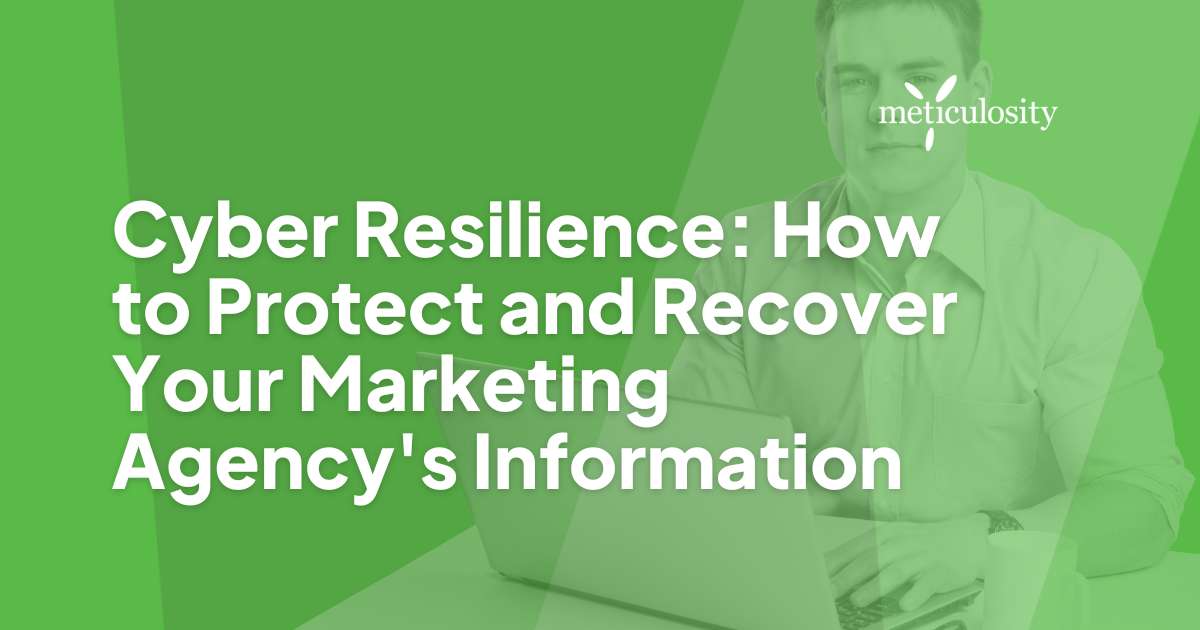In this ever-evolving digital world, the reality of a cyberattack brings a chill to any marketing agency owner. And believe us, the struggle to safeguard client information is real – given that small businesses are in the crosshairs of nearly half of all cyber attacks.
Through this blog, we'll equip you with an ironclad cyber resilience strategy so you're not just weathering the storm but also sailing through it with grace should calamity strike. Key Takeaways
- Cyber resilience is crucial for marketing agencies to protect sensitive client information, maintain business operations, and recover quickly from cyberattacks.
- Creating a strong cyber resilience strategy involves assessing risks and vulnerabilities, establishing a clear policy framework, implementing best practices for data protection, and prioritizing quick recovery measures in the event of breaches.
- Implementing strong cybersecurity measures such as encryption, multi-factor authentication, regular updates and patches, firewalls, intrusion detection systems, and employee training can significantly bolster your agency's defenses against cyber threats while safeguarding sensitive information.
Understanding Cyber Resilience
Cyber resilience is the ability to prevent, limit the impact of, and recover from cyber-attacks. For marketing agencies, it's crucial to protect sensitive client information and maintain business operations.
Implementing a robust cyber resilience strategy can provide numerous benefits in safeguarding against data breaches and ensuring the agency's overall security posture.
Definition and Importance for Marketing Agencies
Cyber resilience means being ready to fight against and recover from online attacks that can hurt your marketing agency's information. It's all about keeping data safe, ensuring you can still do business during an attack, and getting back on your feet quickly if something bad happens.
For marketing agencies, this is huge because they handle a lot of important customer data. If that data got into the wrong hands, it could damage the agency's reputation and cost a lot of money.
Keeping up with cyber resilience best practices helps your agency stay strong against these online threats. We make plans to keep our operations going no matter what. Next, let's talk about creating a solid plan so your agency stands tall in the face of danger.
Benefits of Implementing a Cyber Resilience Strategy
Having a cyber resilience strategy gives your marketing agency a strong shield against attacks. It means you're ready to fight off hackers and keep your client's data safe. If bad stuff happens, like a data breach, this plan helps you bounce back faster and with less harm done.
You'll have steps to follow so everyone knows what to do. This makes clients trust you more because they see that their information is in good hands.
A smart strategy keeps dangers away and sets the stage for growth without fear of cyber threats. Now, let's figure out how to create a solid cyber resilience plan for your agency.
Creating a Cyber Resilience Strategy
Assessing risks and vulnerabilities is the first step in creating a strong cyber resilience strategy for your marketing agency. This involves identifying potential threats and weak points in your systems, processes, and infrastructure.
Assessing Risks and Vulnerabilities
- You need to understand the dangers your marketing agency might face online. Knowing where you are weak helps you stay safe.
- Start by checking all the places where you keep your information. This means looking at your computers, networks, and any place online where you store data.
- Next, think about all the bad things that could happen to this information. This includes hackers trying to steal it or getting hit by a virus.
- Also, ask yourself how likely these bad things are. If something is very likely to happen, you need to be extra careful with it.
- You need to know how much damage these problems could cause. A big attack could stop you from working and cost a lot of money.
- Checking for holes in your security is a must-do. Look for any weak spots like old software or passwords that are too easy to guess.
- Look outside your agency, too. Working with other companies can create risks if they don't protect their information well.
- Then, make a list of everything that's most valuable to you. Keeping your clients' trust is a top priority, so their data is super important.
- The last step is putting it all together in a report. This report tells you what you must fix immediately and what can wait a bit.
Establishing a Policy Framework
Establishing a clear and comprehensive policy framework is at the core of our cyber resilience strategy. This involves clearly defining roles and responsibilities for data protection, outlining guidelines for handling sensitive information, and setting standards for cybersecurity measures.
By creating a well-defined policy framework, we ensure that everyone in the agency understands their part in maintaining information security and minimizing risks. Additionally, it provides a roadmap for implementing necessary security measures and responding effectively to any potential threats or breaches.
It's essential to involve key stakeholders in this process to gain valuable insights into potential vulnerabilities and ensure that the policy framework addresses specific needs within our agency.
Implementing Best Practices for Data Protection
After establishing a policy framework, it's essential to prioritize data protection within your marketing agency. Here are the best practices to follow:
- Encrypt sensitive data to prevent unauthorized access.
- Implement strong password policies and multi-factor authentication for all systems.
- Regularly update and patch software and operating systems to fix vulnerabilities.
- Use firewalls and intrusion detection systems to monitor and control network traffic.
- Conduct regular security audits and assessments to identify and address potential weaknesses.
- Establish clear guidelines for handling and storing sensitive information, including client data.
Looking to empower your agency? Learn more here.
Cyber Recovery Measures
We'll discuss how to prevent and limit the impact of cyber attacks and strategies for quick recovery from breaches.
Preventing and Limiting the Impact of Attacks
Cyber resilience is crucial to minimize the impact of cyberattacks on your agency's information. Here are some measures to prevent and limit the impact of attacks:
- Utilize threat intelligence to identify potential threats and vulnerabilities in your systems.
- Implement robust network security measures, such as firewalls, intrusion detection systems, and encryption protocols, to thwart unauthorized access.
- Regularly update and patch all software and applications to address known vulnerabilities and weaknesses.
- Conduct vulnerability management to identify and address weaknesses in your digital infrastructure proactively.
- Develop an incident response plan outlining clear steps for immediate action in the event of a cyber breach.
Quick Recovery from Breaches
Recovering from a breach needs to be quick and comprehensive. Here are the steps:
- Identify the Scope of the Breach: Determine the extent of the breach and what information or systems have been compromised.
- Isolate Affected Systems: Immediately isolate affected systems to prevent further damage or data loss.
- Assess Impact on Operations: Evaluate how the breach has affected day-to-day operations and client services.
- Implement Recovery Plan: Activate a pre-established recovery plan to restore affected systems and data.
- Communicate with Stakeholders: Inform clients, employees, and relevant authorities about the breach and actions being taken.
- Conduct Post-Incident Analysis: After recovering, analyze the breach to identify weaknesses and improve resilience.
Protecting Agency Information
Implementing strong cybersecurity measures is crucial in protecting your marketing agency's information from cyber threats. This includes implementing firewalls, encryption, and secure passwords to safeguard sensitive data.
Employee training and awareness programs should also be prioritized to ensure all staff members understand the importance of maintaining a secure digital environment. Regular updates and patches for software and systems are essential in staying ahead of potential vulnerabilities while safeguarding critical infrastructure, which helps protect against potential disruptions to operations.
Strong Cybersecurity Measures
Ensuring the security of your agency's information is crucial in today's digital landscape. Here are some strong cybersecurity measures to protect your marketing agency's data:
- Utilize encryption for sensitive data to prevent unauthorized access and maintain confidentiality.
- Implement multi-factor authentication to add an extra layer of security for accessing systems and accounts.
- Regularly update and patch all software and systems to fix vulnerabilities and protect against cyber threats.
- Deploy firewalls and intrusion detection systems to monitor and control incoming and outgoing network traffic, thus preventing unauthorized access.
- Conduct regular security audits to identify weaknesses and areas for improvement in your cybersecurity measures.
- Enforce strong password policies, including regular password changes and the use of complex, unique passwords for all accounts.
- Train employees on best practices for cybersecurity, including identifying phishing attacks, social engineering tactics, and other common threats.
Employee Training and Awareness
It is crucial to prioritize employee training and awareness to ensure the effectiveness of strong cybersecurity measures. Educating your staff about potential cyber threats, best practices for data protection, and how to recognize suspicious activities can significantly enhance your agency's cyber resilience.
Regular training sessions and simulated phishing exercises can help employees stay vigilant and proactive in safeguarding sensitive information. Additionally, fostering a culture of security within the organization ensures that every team member understands their role in maintaining a resilient digital environment.
By prioritizing employee training and awareness as part of your overall cyber resilience strategy, you empower your workforce to become active participants in protecting the agency's information assets.
Regular Updates and Patches
To maintain cyber resilience, it's crucial to regularly update and patch software and systems. These updates often contain security patches that fix vulnerabilities and protect against potential cyber threats like data breaches.
By staying on top of these updates, we can strengthen our agency's defenses and minimize the risk of falling victim to cyberattacks. It's a simple yet effective way to enhance our digital resilience and safeguard sensitive information from unauthorized access or exploitation.
Implementing regular updates and patches could be the difference between a secure system and leaving our agency vulnerable to malicious attacks. With each update, we bolster our cybersecurity posture, making it harder for threat actors to penetrate our defenses.
Safeguarding Critical Infrastructure
Safeguarding critical infrastructure is crucial for protecting your marketing agency's information. It involves securing physical assets like servers and network equipment from unauthorized access or damage.
By implementing security measures such as restricted access, surveillance systems, and environmental controls in your office space, you can help prevent physical breaches that could compromise your agency's data.
Additionally, it's important to safeguard your digital infrastructure by using firewalls, encryption, and other cybersecurity tools to protect against online threats. Regularly updating and patching software also helps maintain the security of your digital infrastructure.
This comprehensive approach ensures that your physical and digital assets are well-protected from potential cyberattacks.
Protecting Intellectual Property
To protect your marketing agency's intellectual property, it's crucial to implement strong cybersecurity measures. This includes creating and enforcing policies to safeguard sensitive data, using encryption techniques, and regularly monitoring access to proprietary information.
Additionally, educating your employees about the importance of intellectual property protection and conducting regular security audits are vital steps in maintaining a secure environment for your agency's valuable assets.
Furthermore, staying informed about the latest cybersecurity threats and trends is essential for adapting your protection strategies accordingly. By prioritizing the safety of your intellectual property, you can ensure that your marketing agency remains resilient against potential cyber threats.

Ensuring Resilience in Operations
Regularly backing up important data and having a comprehensive data recovery plan in place is essential for ensuring resilience in operations. Redundancy in systems and processes also helps to minimize downtime and maintain business continuity in the event of cyberattacks or other disruptions.
Regular Backups and Data Recovery Plans
As a marketing agency, ensuring the security of our information is crucial. Regular backups and data recovery plans play a key role in cyber resilience. Here are important points to consider:
- Implement automated backup systems for all critical data, including client information, marketing materials, and financial records.
- Store backed-up data in secure off-site locations or on encrypted cloud servers to prevent loss in case of physical damage or theft.
- Test data recovery processes regularly to ensure the effectiveness of backup systems.
- Develop a detailed plan for recovering data in case of a breach or system failure, including clear steps and responsible individuals.
- Consider utilizing modern technologies like blockchain or decentralized storage for added security.
Redundancy in Systems and Processes
For cyber resilience, redundancy is key. It ensures that if one system fails, there's another ready to take over. Here's how to incorporate redundancy into your agency's operations:
- Use backup servers in different physical locations to prevent data loss in case of a disaster.
- Implement redundant internet connections to maintain connectivity even if one connection fails.
- Utilize redundant power supplies to keep critical systems running during power outages.
- Employ duplicate hardware and software configurations for essential systems.
- Create redundant communication channels for internal and external communications.
Collaborating with IT Professionals
Seek expert advice from IT professionals to establish effective cybersecurity measures and utilize tools and services to enhance your agency's cyber resilience.
Seeking Expert Advice
When facing the complex landscape of cybersecurity, it is crucial to seek expert advice. Cyber threats are constantly evolving, and partnering with IT professionals can provide valuable insights and guidance on implementing effective cybersecurity measures tailored to your marketing agency's specific needs.
Collaborating with experts can help you stay updated on the latest cyber resilience frameworks, tools, and services that can fortify your agency's defenses against data breaches and cyberattacks.
Additionally, seeking expert advice enables you to better understand potential risks and vulnerabilities unique to the marketing industry, empowering you to mitigate these challenges proactively.
In today's rapidly changing digital environment, navigating cyber resilience can be challenging without the expertise of cybersecurity professionals. By engaging with IT experts, marketers and business professionals can access tailored solutions and proactive strategies that bolster their agency's ability to effectively protect sensitive information from cyber threats.
Utilizing Cybersecurity Tools and Services
Use cybersecurity tools and services to protect our agency's information. Work with IT professionals to choose the right tools for our needs, such as firewalls, antivirus software, and encryption tools.
We regularly update these tools to keep them effective against new threats. Additionally, we implement intrusion detection systems and conduct regular security audits to identify any weaknesses in our systems.
With these cybersecurity measures in place, we can protect our agency's data from unauthorized access or cyberattacks. By staying informed about the latest cybersecurity trends and solutions, we can continuously improve our resilience against potential threats.
Maintaining Cyber Resilience on a Budget
Prioritize measures that offer the most bang for your buck, seek out free or low-cost resources, and implement cost-effective solutions to ensure cyber resilience without breaking the bank.
Prioritizing Measures
When prioritizing measures for cyber resilience, consider the following:
- Identify Critical Assets: Determine which data and systems are most vital to your agency's operations and reputation.
- Assess Vulnerabilities: Conduct regular risk assessments to identify potential weaknesses in your cybersecurity defenses.
- Implement Multi-factor Authentication: Require multiple forms of verification for accessing sensitive information, adding an extra layer of protection.
- Regular Security Updates: Keep all software, applications, and systems updated with the latest security patches and updates to prevent exploitation of known vulnerabilities.
- Employee Training: Invest in ongoing training for employees to recognize and respond to potential cyber threats effectively.
- Secure Remote Access: Secure remote access to agency systems through encrypted connections and stringent access controls.
- Incident Response Plan: Develop a clear plan outlining steps to take in case of a cyber incident or breach, including communication protocols and containment strategies.
- Backup and Recovery: Regularly back up critical data and establish reliable recovery procedures, minimizing the impact of potential data loss or system disruptions.
Utilizing Free or Low-Cost Resources
Know that as a marketing professional, managing costs is important. Here are some ways you can enhance your cyber resilience without breaking the bank:
- Leverage open-source cybersecurity tools and software to bolster your agency's defenses against cyber threats. These resources are often free and regularly updated by a community of developers.
- Take advantage of free training materials and webinars from reputable cybersecurity organizations to educate your team on best data protection and cybersecurity awareness practices.
- Explore government or industry-sponsored initiatives that provide low-cost or no-cost cybersecurity assessments and recommendations for small businesses like marketing agencies.
- Use free online risk management frameworks and templates to assess vulnerabilities, establish policies, and implement cost-effective security measures within your agency.
Implementing Cost-Effective Solutions
As a marketing agency, it's vital to prioritize cost-effective measures for cyber resilience. Here are some ways we've found effective:
- Prioritize essential cybersecurity measures such as firewall protection and antivirus software to safeguard against common cyber threats without overspending.
- Utilize free or low-cost resources like open-source security tools and platforms that offer robust protection without hefty price tags.
- Implement cost-effective solutions such as regular software updates and patches to address vulnerabilities and enhance overall system security.
- Leverage cloud-based backup solutions to ensure data recovery capabilities without investing in expensive hardware or infrastructure.
- Consider managed security services that offer comprehensive protection at a fraction of the cost of maintaining an in-house cybersecurity team.
- Engage in ongoing employee training on cybersecurity best practices, leveraging affordable online resources and workshops to build a culture of security within the agency.
- Explore cost-effective options for penetration testing and vulnerability assessments to proactively identify and address potential weaknesses in the agency's systems.
- Utilize secure password management tools with robust encryption and accessibility features, reducing the risk of unauthorized access without breaking the bank.
- Investigate government or industry-specific grants or subsidies to support small businesses in implementing cybersecurity measures and providing financial relief for resilience initiatives.
- Foster partnerships with other small businesses or industry peers to collectively invest in affordable cybersecurity solutions through group purchasing or shared resources.
The Human Factor in Cyber Resilience
Employee training is crucial in maintaining a security culture and addressing insider threats. To learn more about how to protect your marketing agency's information, continue reading the full blog.
Importance of Employee Training
Employee training is crucial for building cyber resilience within your marketing agency. It empowers your team to recognize and respond to potential threats, reducing the risk of data breaches and cyberattacks.
By providing regular training on cybersecurity best practices, you can create a culture of security awareness among your employees, making them proactive protectors of your agency's valuable information.
Training also helps address insider threats by educating employees about the importance of safeguarding sensitive data and recognizing suspicious activities. This fosters a sense of responsibility and vigilance across all levels of the organization.
Addressing Insider Threats
To maintain a secure environment, addressing insider threats within your marketing agency is crucial. While employee training fosters awareness, it's essential to acknowledge the potential risks posed by insiders who have access to sensitive information.
Implementing strict access controls and monitoring tools can help prevent unauthorized data breaches and ensure that only authorized personnel can access critical business data.
Monitoring employee activities and implementing regular security audits are essential for identifying any unusual behavior or potential security breaches within the organization.
Maintaining a Culture of Security
Maintaining a culture of security in your marketing agency is crucial. It starts with promoting a mindset of vigilance and responsibility among all employees. Regular training sessions on cybersecurity best practices should be conducted to keep everyone informed and alert.
Emphasizing the importance of data protection and privacy creates a collective understanding that security is everyone's responsibility, not just the IT department's.
Encouraging open communication regarding potential threats and breaches within the organization fosters an atmosphere where employees feel comfortable reporting any suspicious activities or concerns without fear of repercussions.
This proactive approach helps create a strong defense against cyber threats while also nurturing a culture where security is valued at every level within the agency, contributing to overall cyber resilience.

Conclusion
Protecting your marketing agency's information is crucial in today's digital world. Implementing a strong cyber resilience strategy can help prevent data breaches and recover quickly from cyberattacks.
You can maintain cyber resilience even on a budget by prioritizing cybersecurity measures, collaborating with IT professionals, and emphasizing employee training. Stay proactive to stay ahead in safeguarding your agency's valuable information.
Click here to learn more about agency marketing.
FAQs
1. Why is cyber resilience essential for marketing agencies, and what does it entail?
-
- Threat Preparedness: Cyber resilience involves preparing for, responding to, and recovering from cyber threats, ensuring continuous operations.
- Business Continuity: It is crucial for maintaining business continuity, minimizing downtime, and mitigating the impact of cyber incidents on agency operations.
- Client Trust: Demonstrates a commitment to safeguarding client information, fostering trust and confidence.
2. How can marketing agencies enhance their cyber resilience and protect against cyber threats?
-
- Regular Training: Conduct cybersecurity training for employees to raise awareness about potential threats and best practices for prevention.
- Multi-Layered Security: Implement a multi-layered security approach, including firewalls, antivirus software, and intrusion detection systems.
- Incident Response Plan: Develop and regularly update an incident response plan outlining steps to take in the event of a cyber incident.
- Data Encryption: Utilize encryption for sensitive data, both in transit and at rest, to protect against unauthorized access.
3. In the event of a cyber incident, how can marketing agencies effectively recover and minimize the impact on their operations?
-
- Incident Response Team: Activate an incident response team to assess the situation, contain the incident, and initiate recovery processes.
- Data Backups: Ensure regular and secure data backups are in place to facilitate quick restoration of critical information.
- Communication Plan: Have a communication plan to notify relevant stakeholders, including clients, about the incident and the steps to address it.
- Post-Incident Evaluation: Conduct a thorough post-incident evaluation to identify vulnerabilities, improve response protocols, and prevent future incidents.
4. How can marketing agencies balance cybersecurity measures with the need for operational efficiency and client accessibility?
-
- Risk-Based Approach: Adopt a risk-based approach to cybersecurity, focusing efforts on protecting the most critical assets and systems.
- User Training: Educate employees on secure practices without compromising efficiency, emphasizing the importance of cybersecurity in day-to-day operations.
- Secure Collaboration Tools: Utilize secure collaboration tools and platforms prioritizing accessibility and data protection.
- Regular Security Audits: Conduct regular security audits to identify and address vulnerabilities, ensuring a proactive approach to cyber threats.
Cyber resilience is a comprehensive strategy encompassing prevention, response, and recovery, ensuring marketing agencies can withstand and recover from cyber threats while maintaining operational efficiency and client trust.







